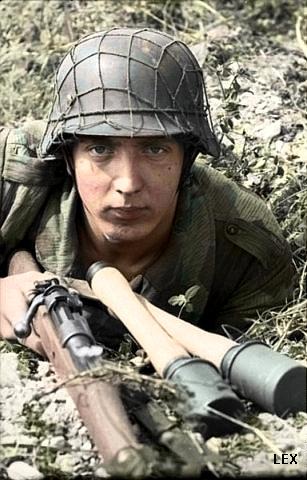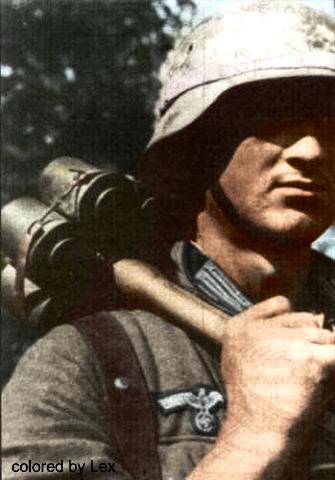Did Germans have a strategy where they would throw multiple grenades at the enemy?
And was it a common strategy?
Thanks in advance
WW2 question
25 Feb 2018, 23:26 PM
#1

Posts: 469
26 Feb 2018, 00:17 AM
#2
Posts: 3787
Y , I think so , in some ww2 photos u see Germans with mg and grenades at the ready position , if the Russians rush you , multiple grenades can be handy in the effect that the Russians would be scared and some would runaway or stay put in the ground . Off course grenades alone do little but can take a toll in the enemy advance towards u .
26 Feb 2018, 00:34 AM
#3
 1
1 Posts: 2885
They used to spread out and all throw granades at once before rushing enemy position. There are some allied training videos warning against such a move as it used to be pretty common.
26 Feb 2018, 01:34 AM
#4
Posts: 250
Improvised "bundle charge"
To counter the lack of effectiveness against hard targets such as tanks and buildings, a common solution was created in the form of an improvised "bundle charge". The charges of a number of M24 grenades – their handles and fuses removed – would be strapped around a complete grenade, usually with simple rope, cloth, or metal wire. These could be crafted with up to six additional charges, and in battle the most-common styles to see were the addition of four or six. Unofficially, these improvised bundle grenades were known as Geballte Ladung (English: bundled charge or concentrated charge).
As a result of this cost-effective and reliable solution, the standard infantryman of the Wehrmacht could quickly improvise a grenade with up to seven times the explosive power. However, the added weight made it more difficult to throw, and the increased size meant that it wasn't practical to carry with one hand and that far fewer could be carried. These factors meant that infantry squads, if faced with an armored enemy, would have to close to a reduced range if they wanted to use the bundle charges. During the early years of World War II, there was little in terms of truly effective German handheld weaponry designed to fight hard targets such as armored vehicles and structures, and even later in the war this style of bundle grenade remained useful to the common Wehrmacht infantryman.


To counter the lack of effectiveness against hard targets such as tanks and buildings, a common solution was created in the form of an improvised "bundle charge". The charges of a number of M24 grenades – their handles and fuses removed – would be strapped around a complete grenade, usually with simple rope, cloth, or metal wire. These could be crafted with up to six additional charges, and in battle the most-common styles to see were the addition of four or six. Unofficially, these improvised bundle grenades were known as Geballte Ladung (English: bundled charge or concentrated charge).
As a result of this cost-effective and reliable solution, the standard infantryman of the Wehrmacht could quickly improvise a grenade with up to seven times the explosive power. However, the added weight made it more difficult to throw, and the increased size meant that it wasn't practical to carry with one hand and that far fewer could be carried. These factors meant that infantry squads, if faced with an armored enemy, would have to close to a reduced range if they wanted to use the bundle charges. During the early years of World War II, there was little in terms of truly effective German handheld weaponry designed to fight hard targets such as armored vehicles and structures, and even later in the war this style of bundle grenade remained useful to the common Wehrmacht infantryman.


26 Feb 2018, 09:45 AM
#5

Posts: 278 | Subs: 1
There is already a fundamental difference in german and "allied grenade" philosophy and tactics since ww1.
"Egg grenades" like the Mills bomb are fragmentation grenades. Ideal for the defense and with a deadly impacts around the grenade.
German stick grenades aka potato mashers were offensive weapons. They had the long stick to be thrown over a large distance and they had much more explosives compared to the Mills bomb to kill an enemy by the shockwave (and not by fragmentation). The german potato mashers were ideal for the attack because they were the most efficient in trenches, bunkers, foxholes and buildings because of the shock effect. Furthermore there were no deadly shrapnel that could wound or kill the german soldiers using the potato mashers. That is one of the reasons why the german army developed egg styled grenades in ww2. The Eihandgranate 39 could be modified in combat with a special fragmentation covering to enforce the defensive capabilities of the grenade. For the offensive use the Eihandgranate 39 was thrown without the fragmentation covering. Without the covering it was a weak version of the german Stielhandgranate (The potato masher).
"Egg grenades" like the Mills bomb are fragmentation grenades. Ideal for the defense and with a deadly impacts around the grenade.
German stick grenades aka potato mashers were offensive weapons. They had the long stick to be thrown over a large distance and they had much more explosives compared to the Mills bomb to kill an enemy by the shockwave (and not by fragmentation). The german potato mashers were ideal for the attack because they were the most efficient in trenches, bunkers, foxholes and buildings because of the shock effect. Furthermore there were no deadly shrapnel that could wound or kill the german soldiers using the potato mashers. That is one of the reasons why the german army developed egg styled grenades in ww2. The Eihandgranate 39 could be modified in combat with a special fragmentation covering to enforce the defensive capabilities of the grenade. For the offensive use the Eihandgranate 39 was thrown without the fragmentation covering. Without the covering it was a weak version of the german Stielhandgranate (The potato masher).
26 Feb 2018, 23:14 PM
#6
Posts: 3787

27 Feb 2018, 00:24 AM
#7
 1
1 Posts: 2885
There is already a fundamental difference in german and "allied grenade" philosophy and tactics since ww1.
"Egg grenades" like the Mills bomb are fragmentation grenades. Ideal for the defense and with a deadly impacts around the grenade.
German stick grenades aka potato mashers were offensive weapons. They had the long stick to be thrown over a large distance and they had much more explosives compared to the Mills bomb to kill an enemy by the shockwave (and not by fragmentation). The german potato mashers were ideal for the attack because they were the most efficient in trenches, bunkers, foxholes and buildings because of the shock effect. Furthermore there were no deadly shrapnel that could wound or kill the german soldiers using the potato mashers. That is one of the reasons why the german army developed egg styled grenades in ww2. The Eihandgranate 39 could be modified in combat with a special fragmentation covering to enforce the defensive capabilities of the grenade. For the offensive use the Eihandgranate 39 was thrown without the fragmentation covering. Without the covering it was a weak version of the german Stielhandgranate (The potato masher).
Your post suggests that only germans used universal and offensive granades in large quantities. That is not exactly true. For example soviets had the rgd-33 granade that could be used both as offensive and defensive granade (with fragmentation element) and had a handle to improve range just like potato masher.
27 Feb 2018, 14:47 PM
#8

Posts: 278 | Subs: 1
Your post suggests that only germans used universal and offensive granades in large quantities. [...]
That's the reason why i have written: "german an allied grenade philosophy". I havent compared soviet or italian or french design here.
The Mills bomb and the Stielhandgranate are "examples" of the different grenade types and philosophies.
Hope that will help to understand my post better.
PAGES (1)

0 user is browsing this thread:
Livestreams
 |
|
|
222 | ||
 |
|
|
5 | ||
 |
|
|
3 |
Ladders Top 10
-
#Steam AliasWL%Streak
- 1.831222.789+37
- 2.34957.860+14
- 3.590215.733+5
- 4.1101614.642+2
- 5.305114.728+1
- 6.916405.693-2
- 7.272108.716+23
- 8.721440.621+3
- 9.1041674.607-2
- 10.17146.788+1
Replay highlight
VS
-
 cblanco ★
cblanco ★ -
 보드카 중대
보드카 중대
-
 VonManteuffel
VonManteuffel -
 Heartless Jäger
Heartless Jäger

Einhoven Country


Honor it
9
Download
1233
Board Info
657 users are online:
1 member and 656 guests
Support Sapper
Support Sapper
0 post in the last 24h
8 posts in the last week
37 posts in the last month
8 posts in the last week
37 posts in the last month
Registered members: 49090
Welcome our newest member, BrubeckDeclarkBurche
Most online: 2043 users on 29 Oct 2023, 01:04 AM
Welcome our newest member, BrubeckDeclarkBurche
Most online: 2043 users on 29 Oct 2023, 01:04 AM











